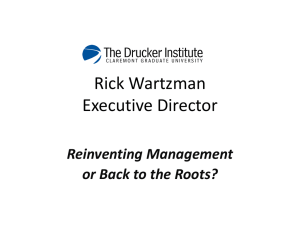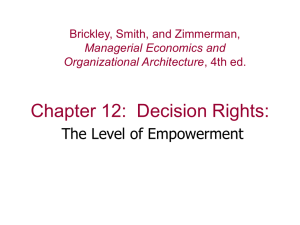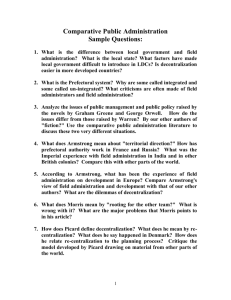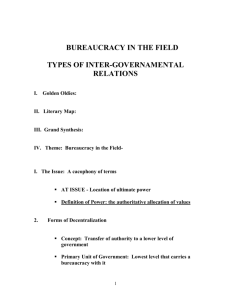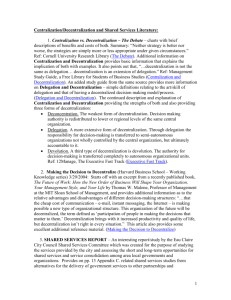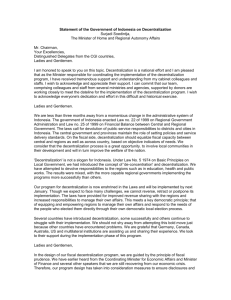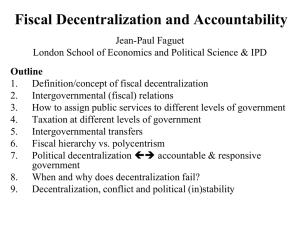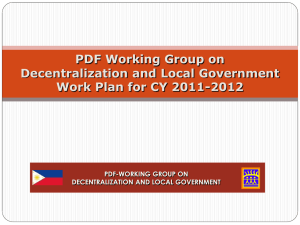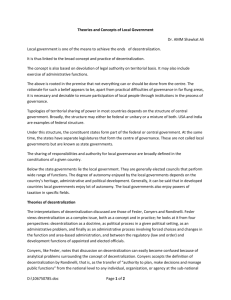Implementing Decentralized Local Governance in South Asia
advertisement
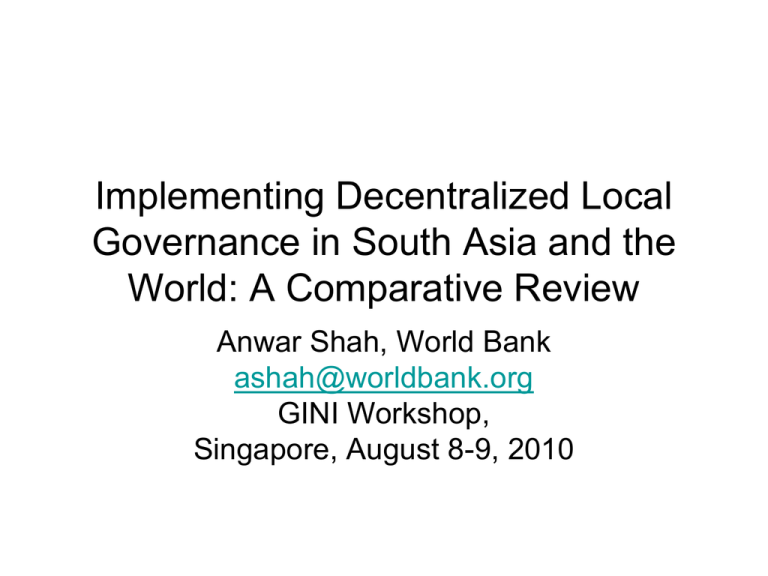
Implementing Decentralized Local Governance in South Asia and the World: A Comparative Review Anwar Shah, World Bank ashah@worldbank.org GINI Workshop, Singapore, August 8-9, 2010 THE VISION Decentralization – what??? “If you do not know where you are going then every road will take you somewhere else”. - Yogi Bera True decentralization: Community empowerment to think globally but act locally. Emerging Vision of Local Government 20th versus 21st century • • • • • • • • • • • • Residuality principle Ultra vires Focus on government Agent of central/provincial governments Dependent on higher govt transfers Accountable to higher governments Direct provider Dependent on central directives Rules driven, bureaucratic, technocratic Exclusive with elite capture Overcomes market failures Boxed in a centralized system • • • Subsidiarity principle Community governance Focus on governance and growth • Primary agent for citizens and gatekeeper for shared rule • Access to sustainable finance • Accountable to voters • Network facilitator • Autonomous • Strengthens voice, choice and exit and results based accountability. • Inclusive and participatory • Overcomes market and government failures Anwar Shah, World Bank • Global and local connectivity Local Govt as a leader/facilitator of Network Forms of Local Governanc National Government Local Government (chair) Regional Government Private (for profit) Providers Community Associations Interest-based Networks Hope-based Anwar Shah, World Bank Networks Other good Samaritans For South Asia it may be back to the future! • “My idea of village swaraj (independent republic) is that it is a complete republic, independent of its neighbors for its own vital wants, and yet interdependent for many others in which dependence is a necessity”. Mahatma Gandhi as quoted in Alok (2006) • Self-governing village communities in India in 1200 BC. Rig Veda as quoted in Alok (2006) • Self –governing urban local governments in Harrapa and Mohenjo-Daro (Pakistan) in 2500 BC. Anwar Shah, World Bank THE CHALLENGE A disgruntled citizen’s perceptions about his government • “Government is the coldest of all cold monsters – whatever it says it lies – and whatever it has -it has stolen.” »Nietzche Perceived Problems of Government in South Asia • • • • • • • • Too remote Too arrogant Too bureaucratic Too big Too inefficient, ineffective Too unaccountable Too opaque Too corrupt Why governments do not deliver? Authorizing Environment Mandate Operational capacity Outputs, reach, outcomes Goals of decentralization reforms –A government that works and serves. But sometimes there are ulterior political motives.. Motivation Countries/Regions Motivation Countries/Region Political & economic transformation Central and Eastern Europe, Russia Improving service delivery Chile, Uganda, Cote D’Ivoire Political crisis due to ethnic conflict Bosnia-Herzegovina, Ethiopia, Yugoslavia, Nigeria, Sri Lanka, South Africa, Philippines To centralize Turkey, European Union Political crisis due to regional conflicts Indonesia, Madagascar, Mali, Senegal, Uganda, Mexico, Nepal, Philippines Shifting deficits downwards Eastern and Central Europe, Russia Enhancing participation Argentina, Brazil, Bolivia, Colombia, India, Pakistan, Philippines Shifting responsibility for unpopular adjustment programs Africa Interest in EU Accession Czech Republic, Slovakia, Hungary, Poland Prevent return to autocracy Latin America Political maneuvering Peru, Pakistan, Afghanistan, Bangladesh Preservation of Communist rule China Fiscal crisis Russia, Indonesia, Pakistan Globalization and information revolution Most countries THE RESPONSE: The Silent Revolution of the 1990s Safeguards against arbitrary dismissal of local governments have improved. • 1 Constitutional/legislative safeguards against dismissal of LG council by CG; 0.5 - LG can be dismissed under certain circumstances; 0 - LG can be dismissed in an arbitrary manner Scorecard on Political Decentralization Region -- Component Constitutional safeguards A F R L E A P L E C A M L A C M M S N A A L M A L L M Elections -Council M M M H L H M Elections - Head L L M H L M M Participation L L M M L M L Recall provisions M L M H L H M Contestability Security of existence L L L M H L H L L M L L M L Overall L L M H L M M “Taking stock” of reforms in DTEs: Political decentralization Progress made: • Legal status of local government • Popular election of local councils and their heads Where accountability is incomplete: • Low participation and contestability in elections • Lack of provisions for popular recall of local officials • Disbandment of local councils by higher level governments Good progress: Latin America, C. and E. Europe Little progress: C. America, Middle East/N. Africa Higher tax autonomy Revenue Autonomy-Taxes • Tax autonomy important for accountability • Local governments have very limited access to own source revenues, even on immobile bases • Tax base sharing rarely practiced Intergovernmental transfers mostly formula based and unconditional ..But ? Perceptions on intergovernmental finance are generally negative • Federal/Central View: Giving money and power to sub-national governments is like giving whiskey and car keys to teenagers. • Provincial and Local View: We need more grant monies to demonstrate that “money does not buy anything”. • Citizens: The magical art of passing money from one government to another and seeing it vanish in thin air. Ironically these perceptions are well founded in reality as most transfers are of “manna from heaven” or pork barrel variety lacking any incentives for local accountability in service delivery performance. Somewhat greater freedom to borrow But access to credit is almost non-existent in South Asia • Access to credit – limited or non-existence due to -Low development of financial markets -Tax centralization • Central policy focus on prohibitions or administrative controls • First steps for credit market access – Tax decentralization – municipal credit rating agencies – Municipal finance corporations Scorecard on Fiscal Decentralization - 1 Region -- Component Rate and Base Autonomy Revenue Adequacy Self financing Munc Services control Health, Education & W Local planning Local procurement Formula transfers A F R L L M H L L L M E A P L M L H H L L H E C A L L L H H H L H L M S A N A A M L L H L H M L H H M H L L L M L L L L L H L H A L L L M M H M L L H Scorecard on Fiscal Decentralization -2 Region -- Component Results based finance Domestic borrowing Domestic Bonds Foreign bank borrowing Foreign bonds capital finance assistance Range of functions Overall A F R L L L L L L L L E A P L M L L L L M M E C A L M M L L L M M L M S A N A A L L L H H H M L L M L L L L L L L L M L L H L L A L L L M L L L L L M “Taking stock” of reforms in DTEs: Administrative decentralization • Ability to hire, fire and set terms of employment of local staff • Ability to contract own taxing and spending responsibilities • Authority to pass bye-laws in their spheres of responsibility • Local governments have regulatory authority for municipal services in most countries. • Significant progress in transition countries (but not in developing countries) Greater freedom to hire and fire Scorecard on Administrative Decentralization Region -- Component Human Resource Management Contracting out/ partnerships Bye-laws Overall A F R L E A P L E L M S C A N A A A H H L L A L L L L M H H L M M M M H H L H M L L H H L L M Decentralization reforms in South Asia have been celebrated with great fanfare but did they bring about F.A.I.R. Local Govern. Will decentralization be sustained? More likely if • broad societal consensus • grassroots support • Big bang Less likely if • Gradual and incomplete e.g back-tracking with opposition by central bureaucrats (Bangladesh, India, Kenya, Pakistan, Sri Lanka); by national politicians – Argentina, Pakistan and Philippines Local Capture? • Greater risk when civic participation low, especially since ability to “vote with one’s feet” low in DTEs. • Particular problem where high inequality of land ownership as I Pakistan • Endogeneity of civic participation? • Non-party elections THE IMPACT: The zone of our ignorance Fiscal Dec and fiscal management – empirical evidence Fiscal performance Quality of debt manag. Quality of FP and Inst. Eff. Revenue Collection Prudent use of taxes Growth of public exp. Control of deficit Growth of public debt PSM GDP growth Impact of Fiscal Dec Positive but insignificant Positive significant Mixed but insignificant Positive significant Negative but insig. Negative but insig. Positive but insig. Positive but significant Positive but insig. Impact of Decentralization on Service Delivery (empirical evidence) Positive Municipal services Pakistan, Bolivia, Colombia, Brazil, Indonesia Education and Health Argentina, Bolivia, Nicaragua Social protection Albania Access to the poor Bangladesh, India, Brazil Impact on corruption India, China, Bangladesh, Colombia, Cote Negative Argentina, Uganda Russia LESSONS Lessons • Decentralization to intermediate levels (states or provinces) in large countries could pose a potential threat to internal peace and political stability. True decentralization means localization. • Localization - a key to local economic development. • Decentralization as a means to an end and not an end itself. • Decentralization is a long and difficult process. Requires a long term holistic vision, patience and persistence. All pieces must fit together. • “Big bang” vs small steps: Long period of consensus building but big bang in implementation • Top down approaches likely to fail. ……..Lessons (2) • Localization is not a gamble but a “no-regrets” approach • No unique model. Custom tailoring a must. • A more nuanced approach to cost recovery desirable. • Capacity constraints less binding than commonly believed and are excessively used to stall reforms. • Reforming government organization and culture is the key to the success of decentralization policies. Epilogue REFORM IS ETERNAL, WE DO NOT ALWAYS SUCCEED BUT WE MUST KEEP TRYING.
